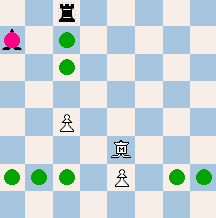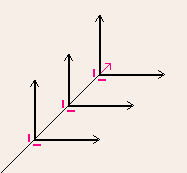

The Meridian is a bifurcation piece. It can move in two legs, the first is a diagonal slide, and the second is an orthogonal bounce-move, along either of two orthogonals in the prolonged movement-direction. It can only capture like a bishop, by jumping directly to the enemy piece, provided that any intermediate squares are empty. While the Meridian slides along a diagonal, several orthogonals (in the prolonged movement direction) could be chosen, provided that there exist screens for bouncing. The Meridian also bounces against the side of the board, but this is only geometrically possible when it moves from one of the extra corner squares, and bounces along the knight file. The Meridian's value is 3, that is, the same as a bishop or knight. Other rules are the same as in standard chess, except for the possible promotion to Meridian. Although the Meridian is dependent on screens for moving it is a dynamic piece that puts great demands on the chessplayer. The H-shaped board gives the Meridian good strategical possibilities, avoiding strategical monotony. The extra corner squares (the trenches) solves the notorious problem of the weak first rank. The trenches affect the strategy greatly. Meridian Chess, and the new Meridian piece, were invented by undersigned, October 2006.
The meridian was a lightly armored gladiator in ancient Rome who fought in the middle of the day, succeeding the morning performances.
 The Meridian can move in two legs, the first is a diagonal slide and the second is an orthogonal bounce-slide. Capturing occurs on the first leg (red = capture).
The Meridian can move in two legs, the first is a diagonal slide and the second is an orthogonal bounce-slide. Capturing occurs on the first leg (red = capture).
 The Meridian's movement principle. In any of its four diagonal movement directions, there could be many screens to choose from. The screens, that are used for bouncing, occur anywhere on the first leg. The red arrow is the capture direction.
The Meridian's movement principle. In any of its four diagonal movement directions, there could be many screens to choose from. The screens, that are used for bouncing, occur anywhere on the first leg. The red arrow is the capture direction.
• You can download my free Meridian Chess program here (updated 2007-10-07), but you must own the software Zillions of Games to be able to run it.
• Don't miss my other chess variants.
© M. Winther (October 2006).